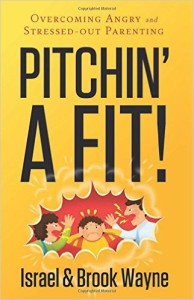 As a pastor, I’ve been able to witness first-hand how many young persons’ lives are damaged by parents whose interactions are dominated by anger. I see many students who then lash out with anger themselves or are just defeated because of the volatility within their house. That being said, I was greatly looking forward to Israel and Brook Wayne’s book Pitchin’ a Fit: Overcoming Angry and Stressed-out Parenting as a resource to implement in teaching, counseling, or to recommend for parents to read.
As a pastor, I’ve been able to witness first-hand how many young persons’ lives are damaged by parents whose interactions are dominated by anger. I see many students who then lash out with anger themselves or are just defeated because of the volatility within their house. That being said, I was greatly looking forward to Israel and Brook Wayne’s book Pitchin’ a Fit: Overcoming Angry and Stressed-out Parenting as a resource to implement in teaching, counseling, or to recommend for parents to read.
There are several commendations for this book. The authors seem to be devoted to the Lord and Scriptural authority. Their words are accessible enough for any parent to understand, with down to earth, even folksy, language with which many people will connect. Its brevity also makes it a non-daunting read that could be consumed in a free afternoon. They also provide helpful steps or diagnostic questions at the end of chapters to help make it very practical. Throughout the book, bits of wisdom pop out as helpful tidbits for parenting. They seek to deal not only with the symptoms but the underlying sources of anger and its effects on our children. They help you walk through what your own motivations are and explain how it can be destructive to children. They do a good job, despite its brevity, to look at anger from many different angles and push you to answer introspective questions regarding its place in your own parenting style.
Now if I was looking for some wisdom on how to deal with anger (or parenting in general) so that I asked a friend for help and they gave me the contents of this book, I would be very happy. I would be impressed by their thoughtfulness and wisdom. I would be able to make some needed changes that would help and would probably recommend others to seek their counsel.
The problem is that a book requires a different kind of authority than is provided here, which relies on their recommendations to feel right/true to the reader. Personally, much of the material seemed to make sense and was quite thoughtful on the topic but I need more from a book than personal anecdotes. The Scripture use throughout was largely prooftexting what they want to say. Other citations are few and far between and are largely used to illustrate rather than give any authority behind the substance of what is being said. In the entire book, not a single theological, exegetical, psychological, or sociological source regarding anger was ever cited or referenced.
In fact, the authors rely on their personal authority so much they disregard normal citation procedures. For example, they write, “Numerous studies have shown that a cluttered home does indeed wear on the nerves of its residents” (p. 71). I don’t doubt this claim but if you are going to reference all the studies out there, I would appreciate at least one to be cited. As a reader, I desire for authors to appeal to solid exegesis of Scripture, scientific studies, or sound reasoning but this book largely relies on anecdotes to bolster statements presented as fact. While I may not be checking their citations, they help suggest to me that the authors actually did some research and know what is being said. So while nothing said convinced me they were clueless, not much was done to convince me they are right.
Overall, I was largely disappointed. I may tentatively recommend this book to certain families dealing with the issue, though with little confidence. I will probably read more in this field of study so that I can offer something of more substance.
I received this book for free in exchange for an honest review from Cross Focused Reviews. I was not required to give a positive review.
- Hospitality in a Covid World - December 17, 2020
- Jesus, the Liberator We Don’t Want - June 12, 2020
- Why I’m NOT an Inerrantist - June 11, 2020



